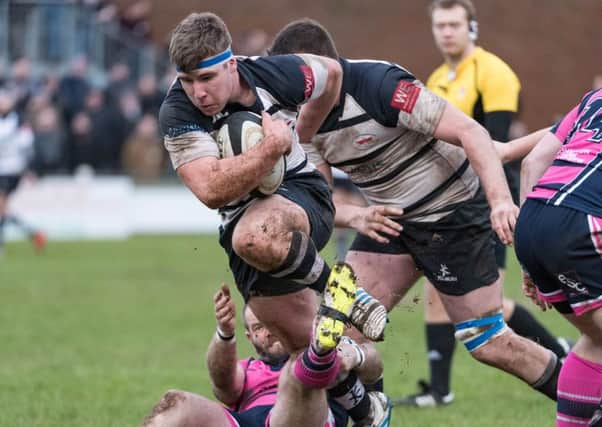Gareth Dyer's rugby column


And having been there to witness it, it is impossible to disagree.
Before Saturday, Hoppers’ best performance of recent times was the pre-Christmas victory over then second-in-the-table Sedgley Park.
Advertisement
Hide AdAdvertisement
Hide AdOn that December day Hoppers squeezed Sedgley to win a game that was more comfortable in victory than the scoreline suggested.
But last Saturday’s performance eclipsed that with Hoppers totally dominant from the 10th minute, with the away side only gaining respectability on the scoreboard with two late and undeserved tries.
For the perfection-hungry Hoppers coaches, that the team conceded three tries and were, in fact, outscored three tries to two on the day – something I will come on to later – will give them the right amount of areas to work on in training this week.
But with confidence coursing through the squad’s veins, the coaches will have the bigger job of keeping feet on the ground for this weekend’s game with strugglers Broadstreet.
Advertisement
Hide AdAdvertisement
Hide AdCurrently in rugby union the sport’s governing body World Rugby are trialing changes to the game’s scoring system.
In domestic leagues in Wales and New Zealand, games are being played with a try being worth six points rather than the current five, whilst penalty kicks in the New Zealand trial may be reduced from the current three points to be worth two.
Whilst the intention behind the trial is positive – namely to encourage more attacking play and try scoring – reducing the value of a penalty sends the wrong message.
If we take Saturday’s game as an example, Hoppers had their visitors under constant pressure for long periods. As a result the Midlanders were forced into giving away a large number of penalties.
Advertisement
Hide AdAdvertisement
Hide AdFor a period of around 15 minutes before half-time the home side was camped in the opposition ‘red zone’ where desperate and illegal defence was employed to prevent the home side from crossing the whitewash.
Teams often take the view in defence that conceding three from a penalty kick rather than seven from a converted try is preferable, particularly if it means you avoid a player being sin-binned for 10 minutes.
This then leads to extra pressure on officials to take more direct action on the defending team.
On Saturday, despite a rising penalty count and a number of deliberate transgressions, no yellow card was forthcoming during that period of pressure and Hoppers took their reward from penalties to build a lead.
Advertisement
Hide AdAdvertisement
Hide AdBut to encourage attacking play we also have to be far more consistent in how deal with illegal tactics in defence.
Currently the decision of whether to award – or not award – a yellow card and send a player to the sin-bin for 10 minutes has no uniform approach.
Some officials provide no prior warning to the giving of a yellow card, whilst others go via a “team totting” up principle.
Then there is the final warning – and sometimes a ‘final final’ warning before eventually after what has seems an eternity the defending side has a player sent to the sin-bin.
Advertisement
Hide AdAdvertisement
Hide AdThus reducing the value of a penalty kick would send the wrong message unless it is backed up with a less lenient handling of teams and individuals intent on ‘tactical infringement’.
Therein lies potential for a further problem.
Could we end up with teams being reduced by three or four players?
Whilst it may send a message to teams not to transgress, it would quickly become messy for spectators, officials and players with sin-bins needing revolving doors for the volume of players coming and going.
The other issue that ‘tactical infringement’ brings into focus is when should a penalty try be awarded?
Advertisement
Hide AdAdvertisement
Hide AdIn the laws of the game a penalty try may be awarded if “a player would probably have scored a try but for foul play by an opponent”.
Here the key word is “probably”.
In some instances, it is clearly apparent that a try would be scored if a last defender cynically takes out a player or deliberately knocks a try scoring pass to ground.
But what about where a team is camped on the opposition line with the defending team giving away repeated technical infringements?
Different officials have a different feel for the game and again some are quick to award penalty tries when their patience runs out, whilst for others it seems the idea never enters their minds.
Advertisement
Hide AdAdvertisement
Hide AdIt is worth pointing out that under the new scoring system Hoppers would have won last Saturday by 26-20 rather than 29-18.
So whilst the right result would have still been achieved, the negative approach of the opposition would have kept them in a game they would have had no right to have been in.